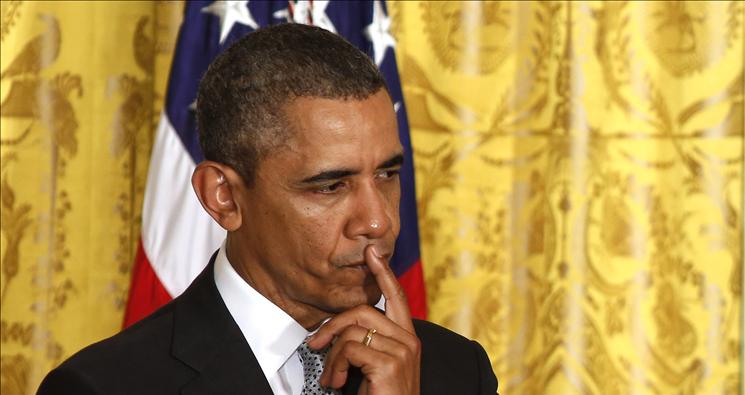The Radical Left’s High-Stakes Gamble on Intolerance
Not for the first time, the radical Left is moving rapidly away from any respect for free speech and pluralism and is decisively throwing itself into creating a self-righteous culture of intolerance and intimidation. It’s playing a dangerous game, one that is already alienating its own allies.
I don’t often type this, but I agree with every word Andrew Sullivan says here about Mozilla ridding itself of its independent-thinking CEO:
As I said last night, of course Mozilla has the right to purge a CEO because of his incorrect political views. Of course Eich was not stripped of his First Amendment rights. I’d fight till my last breath for Mozilla to retain that right. What I’m concerned with is the substantive reason for purging him. When people’s lives and careers are subject to litmus tests, and fired if they do not publicly renounce what may well be their sincere conviction, we have crossed a line. This is McCarthyism applied by civil actors. This is the definition of intolerance. If a socially conservative private entity fired someone because they discovered he had donated against Prop 8, how would you feel? It’s staggering to me that a minority long persecuted for holding unpopular views can now turn around and persecute others for the exact same reason. If we cannot live and work alongside people with whom we deeply disagree, we are finished as a liberal society.
And I say this even less, but I also agree with Michelle Goldberg, writing in The Nation about a different leftist intimidation campaign — the move to cancel Stephen Colbert’s show after he made a lame racial joke:
Call it left-wing anti-liberalism: the idea, captured by Herbert Marcuse in his 1965 essay “Repressive Tolerance,” that social justice demands curbs on freedom of expression. “[I]t is possible to define the direction in which prevailing institutions, policies, opinions would have to be changed in order to improve the chance of a peace which is not identical with cold war and a little hot war, and a satisfaction of needs which does not feed on poverty, oppression, and exploitation,” he wrote. “Consequently, it is also possible to identify policies, opinions, movements which would promote this chance, and those which would do the opposite. Suppression of the regressive ones is a prerequisite for the strengthening of the progressive ones.”
She continues:
As the radical cultural critic Ellen Willis wrote in 1997, at another moment of widespread left-wing illiberalism, “It’s the general repressiveness of the social climate that encourages moves to ban offensive speech or define any form of sexual oppression in the workplace as sexual harassment. The main effect of these maneuvers is to foment confusion, cynicism and sexual witch-hunts, trivialize sexual violence, and legitimize conservative demands for censorship—while at the same time ceding the moral high ground of free expression to the right.”
No, the radical Left isn’t just “ceding” the free-speech high ground to conservatives, it’s deeding it over — a free gift of one of America’s most important cultural and legal traditions. This is a high-stakes gamble — one apparently built on the idea that generations of leftist-dominated education and pop culture have sufficiently changed our nation so that we’re willing to turn our backs on pluralism and religious tolerance (not just tolerance of other religions but also tolerance of religion itself). It’s an idea born in Leftist urban and campus enclaves so walled-off from the rest of American life that many of these people could honestly declare they don’t know a single conservative Christian.
But this new intolerance — as it directly confronts orthodox Christianity — is now colliding not just with free speech but with millions of Americans’ source of deepest meaning and purpose. I had the privilege writing this week’s cover storyin the print edition of NR (about the history of the Religious Freedom Restoration Act and the decline of respect for religious liberty), and here is how I described the power of the religious idea:
Religious liberty exists as a core civilizational value not just because pluralist societies profit from it, but because the human heart demands it. If history teaches anything, it teaches that the religious impulse — the sense of eternity set in the hearts of men (to paraphrase Solomon) — is nothing if not powerful.
It’s an impulse that can and does change lives and nations. It’s an imperative so strong that even the mightiest of totalitarian governments struggle to suppress it. The desire of many millions to follow God is good, but it also just is — it is a primal force that must be acknowledged and respected to the extent that its exercise does not harm the rights of others. In fact, the very act of suppression in the name of uniformity can perversely fray the bonds of a pluralistic society. In liberty, there is unity. Not in conformity.
Can shaming and intimidation overcome the faithful? It can certainly overcome the casual believer, but that won’t be enough for the radical Left. They simply can’t tolerate even the existence of a coherent dissent. So they roll the dice, lashing out at America’s orthodox believers to drive them from the public square, but at the same time they need to remember: Not every American — not every leftist — loves a bully.
